Content
The trouble with many truly popular and tasty tomatoes is that too many people want to grow them and often confusion and over-grading arises with their seeds. Unscrupulous growers are ready to sell something completely different from what gardeners want to grow under the emblem of a super popular tomato variety. And sometimes confusion arises not only with seeds, but also with the names of varieties.
So, for example, the Sevryuga tomato, the description of the variety and characteristics of which are presented in this article, is often also called Pudovik. However, tomato Pudovik appeared somewhat earlier than Sevryuga and was registered in the State Register of Russia back in 2007. At the same time, the Sevruga tomato variety is completely absent in the State Register. But meticulous gardeners have already tested both varieties several times, growing them side by side on the same bed, and came to the conclusion that they are so similar in all characteristics that they are one and the same variety.
Some believe that Sevryuga is the same Pudovik, only more adapted to the northern and harsh Siberian conditions. Hence the opinion that this is one and the same variety, which has two different names: one is more official - Pudovik, the other is more popular - Sevryuga.
Be that as it may, the article will consider the characteristics of tomatoes that are grown under both names and reviews of gardeners, which may differ in the description of tomatoes, but are unanimous in one thing - these tomatoes deserve to be settled on their site.
Description of the variety
So, the Pudovik tomato, which serves as the twin brother of the Sevryuga tomato, was bred by the famous Russian breeders Vladimir Dederko and Olga Postnikova in 2005. Since 2007, it has appeared in the state register and began to explore the vastness of Russia, either under its own name or under the name of Sevryuga.
It is declared as an indeterminate variety, although in this regard there are already differences of opinion among gardeners.
Therefore, it is necessary to be careful with pinching it. It is better to always reserve one of the most powerful stepchildren who can continue the development of the bush. Otherwise, the yield may be minimal.
Manufacturers also do not say anything about the height of the bush, meanwhile opinions here also differ greatly. For some gardeners, the bushes reached only 80 cm, however, when grown in the open field. For many others, the average height of the bush was 120-140 cm, even when planted in a greenhouse. Finally, some note that their Sevruga tomato bushes reached 250 cm in height. And this is with the same size, shape, color and other characteristics of the fruit.
In general, everyone notes that Sevruga tomato bushes branch easily and, having weak and relatively thin stems, lie under their own weight. Therefore, in any case, tomatoes of this variety need a garter.
The inflorescence is a simple raceme, the stalk has an articulation.
Sevruga tomato ripens in the traditional terms for most tomatoes - at the end of July - August. That is, the variety is mid-season, since a total of 110-115 days pass from germination to harvest.
The declared average yield is quite decent - 15 kg of tomatoes can be harvested from one square meter and even more with careful care. Thus, the yield from one tomato bush is about 5 kg of fruit.
But still, in order to obtain maximum yields, it is better to provide tomatoes with good conditions and careful care.
Sevruga tomato also has good resistance to a standard set of tomato diseases. Therefore, you can try to grow it even for novice gardeners.
Fruit characteristics
The fruits are the main source of pride of this variety, because even if you are slightly disappointed in them at the stage of growing seedlings, then after the tomatoes ripen you will be fully rewarded. Tomatoes have the following characteristics:
- The shape of tomatoes can be either heart-shaped or flat-round. It can be smooth or ribbed, but most often it looks like with small dents along the surface of the fruit.
- In an unripe form, the fruits of Sevruga have a green tint, and when mature, their color becomes pink-crimson with a slight shade of red. It is not bright, but very intense.
- The pulp of tomatoes is moderately soft and very juicy, there are at least four seed chambers. The skin is of medium density. The name of the Sevruga variety was most likely given to the tomatoes because their fruits in the section resemble the flesh of this delicious fish. When overflowing tomato bushes, especially after a long drought, Sevruga fruits may be prone to cracking.
- Sevryuga tomatoes are large and very large in size. On average, their weight is 270-350 grams, but there are often specimens weighing up to 1200-1500 g. It's not for nothing that this variety is also called Pudovik.
- The fruits of this variety are distinguished by excellent taste characteristics and in this regard, all gardeners who grow the Sevryuga variety are united - these tomatoes are very tasty and aromatic. By design, they are also universal - and are not very suitable except for whole-fruit canning, since there will be difficulties with stuffing them into jars. But the salads and juice from them are just wonderful.
- Like many delicious tomatoes, they have some difficulties with transportation, and they are not stored for very long. It is best to eat them and process them within two to three weeks after removing them from the bush.
Growing features
As with the cultivation of many mid-season tomatoes, it is advisable to sow the seeds of this variety for seedlings somewhere throughout the month of March, 60 - 65 days before the intended planting in a permanent place. Since the seeds may differ in uneven germination, it is better to soak them in advance in growth stimulants for a day: Epine, Zirkone, Imunnocytofit, HB-101 and others.
Seedling tomato Sevruga does not differ in strength and tends to grow more in height than in thickness.
Therefore, do not worry about its appearance, provide it with maximum lighting, preferably sunny, and keep it in relatively cool conditions so that it does not stretch too much, but the root system develops better.
If you want to grow Sevruga tomato bushes with minimal pinching, leaving two or even three stems, then plant the bushes as rarely as possible, remembering that they can thicken strongly. In this case, plant no more than 2-3 plants per square meter. If you wish, on the contrary, to lead the bushes into one stem, then up to four tomato bushes can be placed on one square meter.
For the rest, caring for Sevruga tomatoes is not much different from other tomato varieties. Just try not to overfeed this tomato with fertilizers, especially mineral fertilizers. Be aware of its tendency to cracking. Instead of abundant and regular watering, it is better to use mulching with straw or sawdust - you will save both your efforts and the appearance of the tomatoes. The Sevruga tomato is distinguished by several fruiting waves, so you will have the opportunity to pick tomatoes until the very onset of cold weather.
Reviews of gardeners
Among the reviews of people growing this tomato variety, there are practically no negative ones. Separate remarks are related to the re-grading of seeds, and the taste of unripe fruits.
Conclusion
The Sevruga tomato is deservedly loved and popular among gardeners for many of its qualities: excellent taste, yield, size of fruits and unpretentiousness to growing conditions.
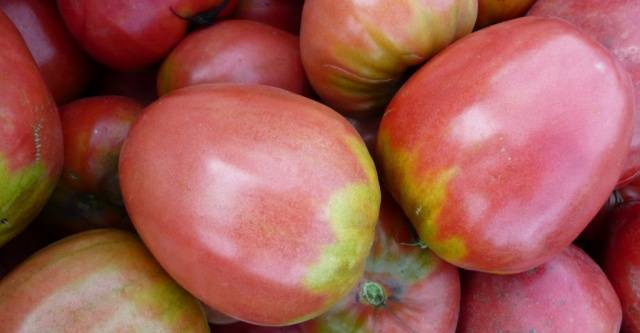
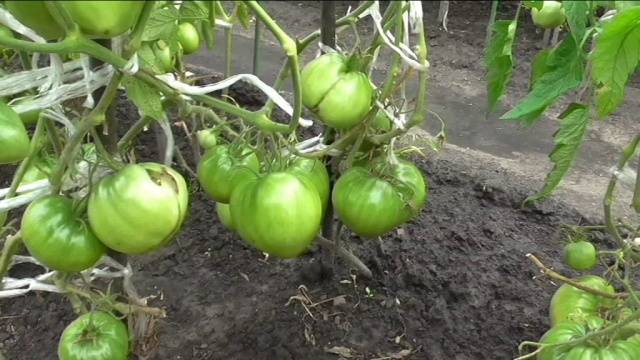
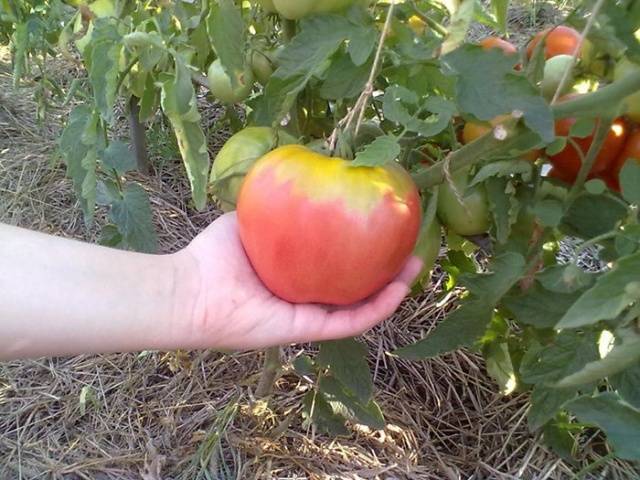
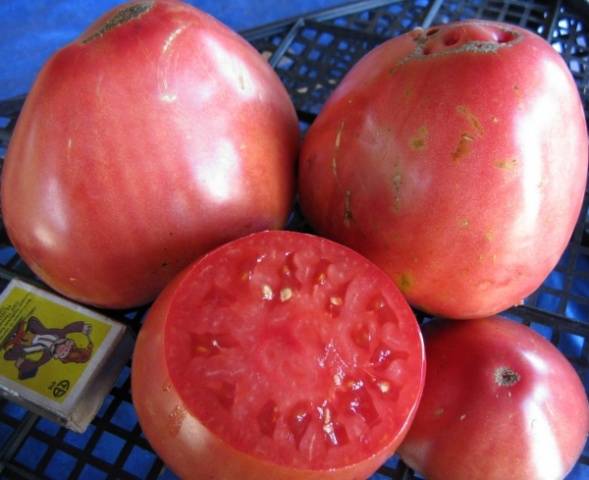
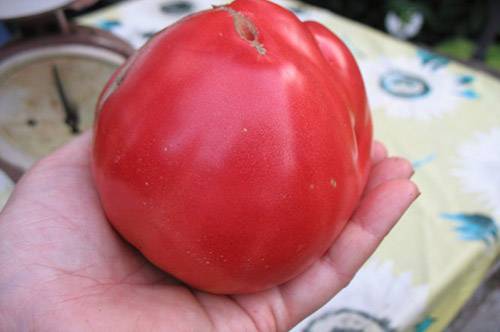
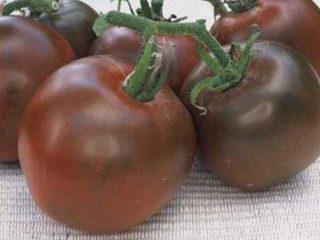


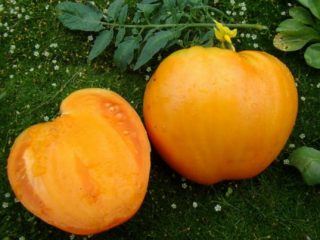


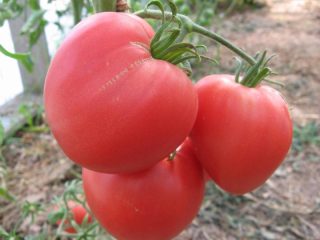


For the third year I have been growing the Sevruga variety. Really very tasty, fairly large tomatoes. But some of the first to fall ill with brown spot, as if it were spreading from them. The bushes are uneven, some are smaller: both leaves and fruits.